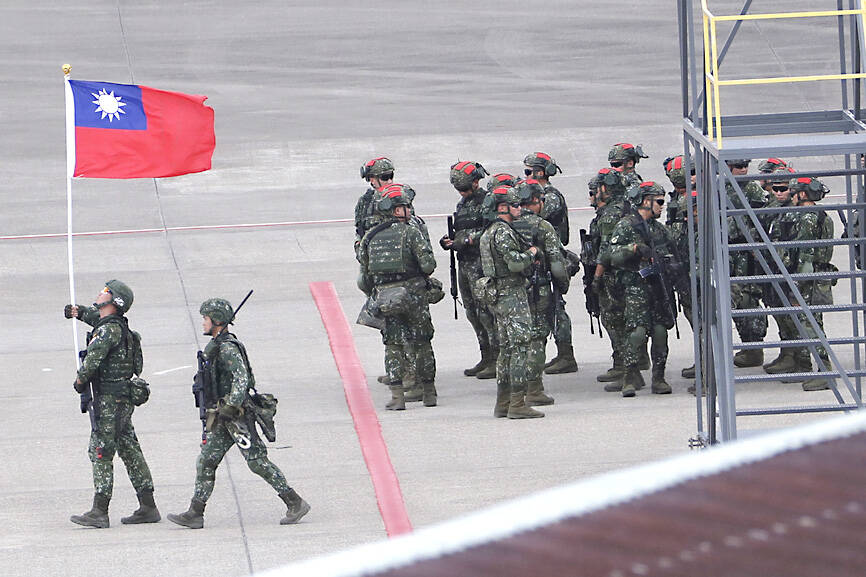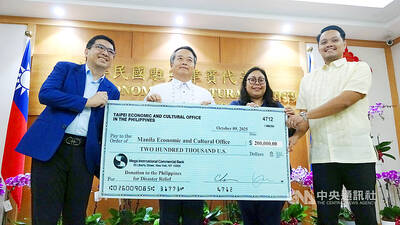China is increasing its military pressure on Taiwan through “gray zone” tactics to influence the nation’s presidential election next month, a British academic said on Thursday last week.
Chinese military aggression against Taiwan has been increasing since then-US House of Representatives speaker Nancy Pelosi’s visit to Taiwan in August last year, National Public Radio (NPR) reported.
Beijing has been utilizing “gray zone” tactics — gradually wearing the nation down with intimidation and harassment, but avoiding the involvement of the US and its allies, it said.

Photo: Chiang Ying-ying, AP
With the “constant reminder that China has its sights on Taiwan,” the strategy is perceived by some as “practice for a real invasion,” it said.
“Pelosi’s trip also prompted China to look for ways to up the ante over Taiwan,” it added.
Alessio Patalano, a researcher on East Asian warfare and security at King’s College London, told NPR that Beijing “has been committed to push the envelope in terms of what is [an] acceptable level of the use of force underneath open war.”
Military and economic coercion are China’s preferred ways to intimidate Taiwan and attempt to sway the election, Patalano said.
Former chief of the general staff Lee Hsi-ming (李喜明) said that the military activities provide China with opportunities to test its military, as well as Taiwan’s capability to respond, NPR reported.
While Taipei wants to avoid escalating tensions in the Taiwan Strait, it has to “passively respond to this kind of gray zone aggression” to maintain morale, Lee said.
However, Taiwan has limited response capability, as “China just has way more of everything,” he said.
Taiwan has about 169,000 personnel on active duty in its armed forces and 2 million reserve forces, compared with more than 2 million Chinese active-duty personnel, the largest army in the world, it reported.
The increased frequency of China’s military activities, which is not expected to relent leading up to the vote on Jan. 13, is driving up Taiwan’s defense costs and straining its pilots, it added.
Taiwan has pilots on standby at all times to intercept Chinese planes that make incursions into Taiwan’s air defense identification zone, a pilot was quoted as saying.
Another pilot said that the air force is working on recruiting more young pilots to give its personnel more time to rest and recover, it said.
“China is trying to scare Taiwanese voters into being more pro-China” through these acts of intimidation, National Chung Hsing University professor of politics Tsui Chin-kuei (崔進揆) told NPR.
However, “gray zone” tactics do not tend to bring about the effects that Beijing desires, Tsui said, citing surveys showing that more than half of Taiwanese supported Pelosi’s visit and under 10 percent considered China a trustworthy partner.
However, China could step up its coercion by conducting more frequent and lengthy military drills around Taiwan, NPR quoted experts as saying.

A drunk woman was sexually assaulted inside a crowded concourse of Taipei Railway Station on Thursday last week before a foreign tourist notified police, leading to calls for better education on bystander intervention and review of security infrastructure. The man, surnamed Chiu (邱), was taken into custody on charges of sexual assault, taking advantage of the woman’s condition and public indecency. Police discovered that Chiu was a fugitive with prior convictions for vehicle theft. He has been taken into custody and is to complete his unserved six-month sentence, police said. On Thursday last week, Chiu was seen wearing a white

The Taoyuan Flight Attendants’ Union yesterday vowed to protest at the EVA Air Marathon on Sunday next week should EVA Airway Corp’s management continue to ignore the union’s petition to change rules on employees’ leave of absence system, after a flight attendant reportedly died after working on a long-haul flight while ill. The case has generated public discussion over whether taking personal or sick leave should affect a worker’s performance review. Several union members yesterday protested at the Legislative Yuan, holding white flowers and placards, while shouting: “Life is priceless; requesting leave is not a crime.” “The union is scheduled to meet with

‘UNITED FRONT’ RHETORIC: China’s TAO also plans to hold weekly, instead of biweekly, news conferences because it wants to control the cross-strait discourse, an expert said China’s plan to expand its single-entry visa-on-arrival service to Taiwanese would be of limited interest to Taiwanese and is a feeble attempt by Chinese administrators to demonstrate that they are doing something, the Mainland Affairs Council said yesterday. China’s Taiwan Affairs Office (TAO) spokesman Chen Binhua (陳斌華) said the program aims to facilitate travel to China for Taiwanese compatriots, regardless of whether they are arriving via direct flights or are entering mainland China through Hong Kong, Macau or other countries, and they would be able to apply for a single-entry visa-on-arrival at all eligible entry points in China. The policy aims

The government yesterday donated US$200,000 to the Philippines to support post-earthquake relief and recovery efforts, following a powerful magnitude 6.9 quake that struck Cebu Province late last month, killing at least 72 people and injuring 559 others. The donation was presented earlier yesterday by Representative to the Philippines Wallace Chow (周民淦) to Cherbett Maralit, deputy resident representative of the Manila Economic and Cultural Office, at Taiwan’s representative office in Manila. In his remarks, Chow expressed concern for those affected by the magnitude 6.9 earthquake that struck the central Philippines on the night of Sept. 30. "We sincerely hope for the earliest possible